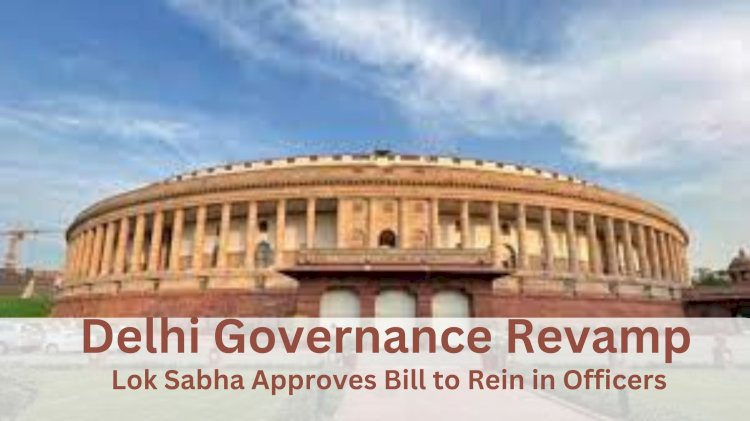Delhi Governance Revamp: Lok Sabha Approves Bill to Rein in Officers
The Lok Sabha has successfully passed the "Delhi Officers Control Bill," aiming to grant the central government more authority in overseeing administrative officers in Delhi. The bill's passage in the Lok Sabha sparked intense debates between the ruling party and the opposition, with proponents emphasizing streamlined governance and detractors expressing concerns over the potential misuse of power and autonomy. The bill now heads to the Rajya Sabha for further consideration, with its fate poised to significantly impact Delhi's administrative setup. As the nation awaits the decision, all eyes are on whether this legislation will lead to more efficient and accountable governance or trigger further discussions on the balance between central government authority and elected representatives' autonomy in the capital.
By Shreya Rajvanshi Gangal

In a significant development, the Lok Sabha successfully passed a crucial bill aimed at establishing greater control and accountability over Delhi's administrative officers. The bill, which seeks to empower the central government with more authority in overseeing the functioning of officers in the National Capital Region, was met with fierce debates and discussions during its presentation in the lower house. With the bill's passage in the Lok Sabha, all eyes are now on the Rajya Sabha, where it is scheduled for consideration today. The outcome of the Rajya Sabha's decision could have far-reaching implications for the governance and administration of Delhi, making this a matter of immense national importance.
The "Delhi Officers Control Bill" was introduced in the Lok Sabha by the ruling government, citing the need for more streamlined and effective governance in the nation's capital. According to the provisions of the bill, the central government will have enhanced supervisory powers over the officers working in Delhi's administrative machinery. The bill aims to address issues of bureaucratic inefficiency, lack of accountability, and administrative gridlock that have often plagued Delhi's governance.
During the heated debates in the Lok Sabha, representatives from both the ruling party and the opposition expressed their divergent views on the bill. Proponents of the bill argued that it was essential to curb the frequent tussles between the Delhi government and the Lieutenant Governor, which often hindered the smooth functioning of the administrative machinery. They contended that the bill would ensure a cohesive working relationship between the elected government and the administrative officers, ultimately benefiting the citizens of Delhi.
On the other hand, the opposition raised concerns about potential misuse of power and undermining the autonomy of the Delhi government. They stressed the importance of maintaining the federal structure and protecting the rights of elected representatives to govern the region as per the mandate given by the people of Delhi.
The passage of the bill in the Lok Sabha was met with a mix of jubilation from the ruling party and disappointment from the opposition. Nonetheless, it marked a significant step towards realizing the government's vision of streamlined governance in the national capital.
Conclusion:
As the Delhi Officers Control Bill now moves to the Rajya Sabha for further consideration, the fate of this critical legislation hangs in the balance. The deliberations in the upper house are expected to be as intense as those in the Lok Sabha, with members from various parties putting forth their arguments passionately.
If the bill manages to secure the approval of the Rajya Sabha, it will then head to the President's desk for formal assent, after which it will become law. On the other hand, if it faces rejection or amendments, it will necessitate further discussions and negotiations between the two houses.
The eventual outcome will significantly impact Delhi's administrative setup and governance dynamics. As the nation eagerly awaits the decision from the Rajya Sabha, the focus remains on whether this bill will indeed usher in an era of more efficient and accountable governance or if it will spark further debates and discussions on the delicate balance between the central government's authority and the autonomy of elected representatives in the nation's capital.
What's Your Reaction?



















